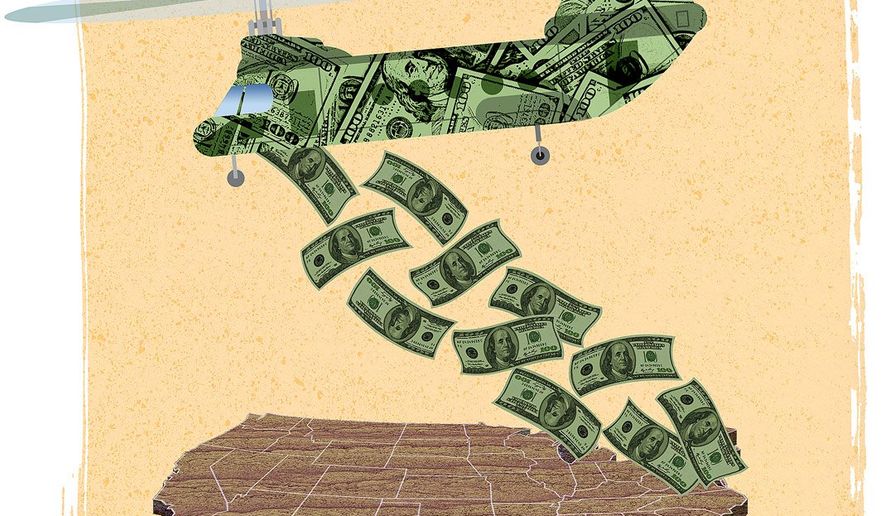OPINION:
The Federal Reserve — frustrated by its inability to consistently accomplish strong growth and 2 percent inflation — is reviewing strategies. Maybe it should simply hand out money to ordinary folks, helicopter money, instead of just to banks.
Historically, when the economy slowed, the Fed pushed down the rate banks pay each other for overnight loans and that rippled through to rates for short-term lines of credit, 10- and 30-year Treasury securities, corporate bonds and home mortgages.
Along with buying and selling Treasury securities to manipulate the federal funds rate, the Fed can adjust what it pays banks for their deposits at the central bank. Currently, banks receive 2.4 percent on those checking accounts, while magnanimously paying ordinary folks less than 0.2 percent.
If you think President Trump is over-agitated about the Fed setting interest rates too high, consider that banks have a limited incentive to offer loans to businesses to create jobs when they can earn a two-point spread by just moving your deposits to their private Fed accounts.
The upshot is banks demand 5.5 percent for the safest short-term business loans — a 5.3-point margin over what they pay depositors. And now you know why JP Morgan can pay its employees extraordinary salaries.
The federal funds rate Fed policymakers consider neutral — one that will neither boost inflation nor slow economic activity — has fallen. Prior to the financial crisis, the Fed raised that rate to 5.25 percent but it would never set it that high even with unemployment so low these days.
Currently, the target is about 2.4 percent; consequently, the Fed does not have much room to cut rates if the economy slows. That’s the most compelling reason for its strategic review.
Moreover, longer term rates on Treasury securities, corporate bonds to finance big investment projects and home mortgages do not move up and down with federal funds rate as they once did. As the Fed raised that rate four times in 2018, the Fannie Mae 30-year mortgage rate rose but then fell back — even before the final Fed rate increase in December.
Globally, ordinary business is increasingly conducted in dollars, even when Americans are not involved. The dollar’s share of cross-border debt financing has jumped to 62 percent even though the United States is only about one-fifth of the global economy. Forty percent of all cross-border trade is denominated in dollars — 23 percent of German exports are pegged to the dollar but only 6 percent of those are headed for the United States.
To accommodate all this, foreign businesses and individual investors hold large amounts of U.S. securities and foreign banks issue dollar-denominated deposits. If U.S. long rates creep up in response to adjustments in the federal funds rate, foreign money flows into U.S. Treasuries and mortgage-backed securities to drive those rates back down.
In the wake of the financial crisis, the Fed lowered the federal funds rate to near zero in 2008 without much effect. Ordinary folks on the precipice of bankruptcy — thanks to job losses, crashing stock and home prices, and mortgages under water — were not about to borrow to buy cars or remodel kitchens. And banks were not about to lend to technically insolvent customers.
The Fed turned to quantitative easing — it purchased $3.7 trillion longer-term Treasuries and 30-year mortgage backed securities — and helped the Treasury bail out the biggest banks.
Free money for banks is like free steel for automakers but did little to revive the economy because banks had no appetite for new lending. And consumers required several years to work off excessive credit card balances, unload houses they couldn’t afford or get debt forgiven altogether.
The next time a recession harkens, the Fed might consider being more democratic and not just hoisting free money on banks but giving it to ordinary working folk, too.
Recently, the Fed began offering interest-paying deposits to hedge funds and asset managers. With money marketeers paying CEOs $30 million a year and rather ordinary MBAs huge bonuses, too, it seems only fair to let working folks open interest-paying accounts at the Fed, too.
Then when dark clouds gather, instead of giving money to banks to squander on big salaries, deposit a tidy sum in the account of every American to spend or pay down debt.
That would get the economy rolling again — quickly.
• Peter Morici is an economist and business professor at the University of Maryland, and a national columnist.




Please read our comment policy before commenting.